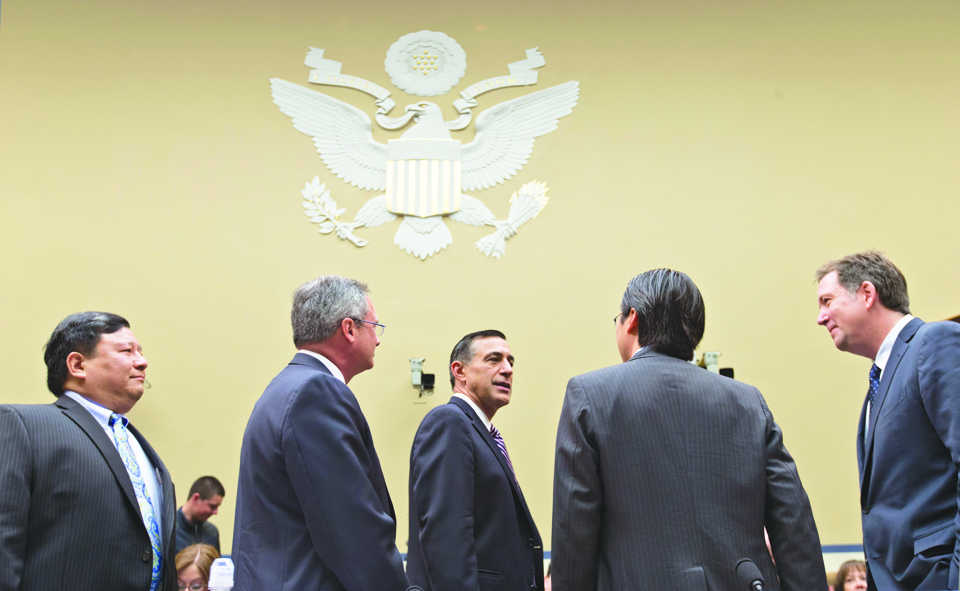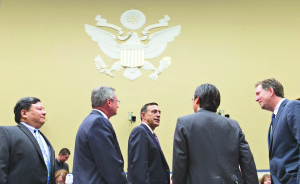

By Pat Higgins | Asst. Sports Editor
The 16-day government shutdown ended last month and extended the federal government’s deadline to pay its bills for two months. But the Dec. 13 deadline that President Obama set for the bipartisan House-Senate committee negotiating fiscal policy and the federal budget is fast approaching, and an expansive ideological gap between Democrats and Republicans remains.
The president and his healthcare reform, the Affordable Care Act, have reached an all-time low in approval ratings. According to a Nov. 10 Gallup poll, more than half the country (55 percent) disapproves of Obamacare, while only 40 percent approve of the job the president is doing.
Right now, experts estimate that the government’s financing will expire in February, when the government reaches its $16.7 trillion debt ceiling. But don’t expect any major shifts in fiscal policy in Washington before the president’s mid-December ultimatum rolls around, or before the debt ceiling expires on Feb. 7, as the country and thus politicians nationwide remain split on Obama’s healthcare agenda.
Moni McIntyre, an assistant professor in the Graduate School for Social and Public Policy, said she believes the ACA will ultimately do more good than harm, but Americans are currently suffering from “mean-spirited debates” in the capital.
“Along with many others, I am unhappy with the ACA, because I do not think that it went far enough,” McIntyre said. “I hope for a single payer option at some point in the not-too-distant future, but I realize that the chances of that happening are slim to none.”
But as long as Obamacare remains at the center of Congressional and national dispute, the United States’ economic outlook will remain bleak.
Antony Davies, associate professor of economics in the Palumbo Donahue School of Business, said he believes the debt ceiling will rise again, but opposing factions in the American public will stifle any compromise in fiscal negotiations for a long-term solution.
“It is possible to raise the debt ceiling, and that is what will happen,” Davies said. “But I don’t see Republicans and Democrats settling their fiscal disputes until there is a clear majority of voters demanding fiscal discipline. The problem is less the ideological differences than the contradictory desires of the voters. Voters are concerned about the deficit, but there isn’t a majority who want higher taxes, nor is there a majority hat wants significant spending cuts. So, politicians are left not knowing how to proceed.”
U.S. Treasury Secretary Jacob J. Lew advocated that Congress raise the debt limit much sooner than later at the Wall Street Journal’s CEO Council conference on Nov. 19.
“There really is no alternative but to raise the debt limit when you need to borrow in order to pay the bills,” Lew said. “The full faith and credit of the United States – whether it’s bonds or contracts or benefits – has to be honored,” according to a November story from Businessweek.
Just a few months from now, our government will not be able to honor its debt commitments. And unless the budget reform committee Obama mandated following the government shutdown strikes any sort of agreement before Christmas, the two parties will remain far apart on any long-term plans to cut fiscal spending and reduce the national deficit.
Democrats are lobbying for tax increases on the rich, something Republicans oppose. Republicans are demanding major changes to the Affordable Care Act for fear of its impact on the federal deficit. But Democrats refuse any major changes in Medicare or Social Security without tax reform.
“The Affordable Care Act will play a significant role in the federal budget,” Davies said. “No one knows by how much it will increase deficits, but economists are in general agreement that the impact on the deficit will be somewhere between significant and astronomical. I tend to fall in the ‘significant’ camp.”

